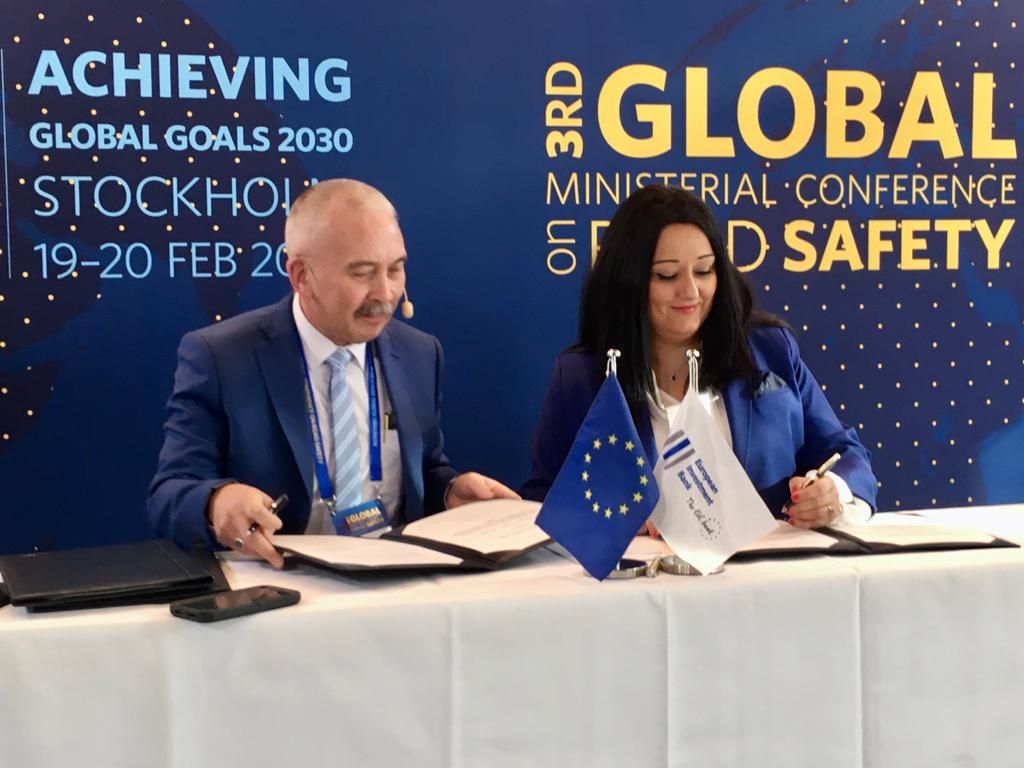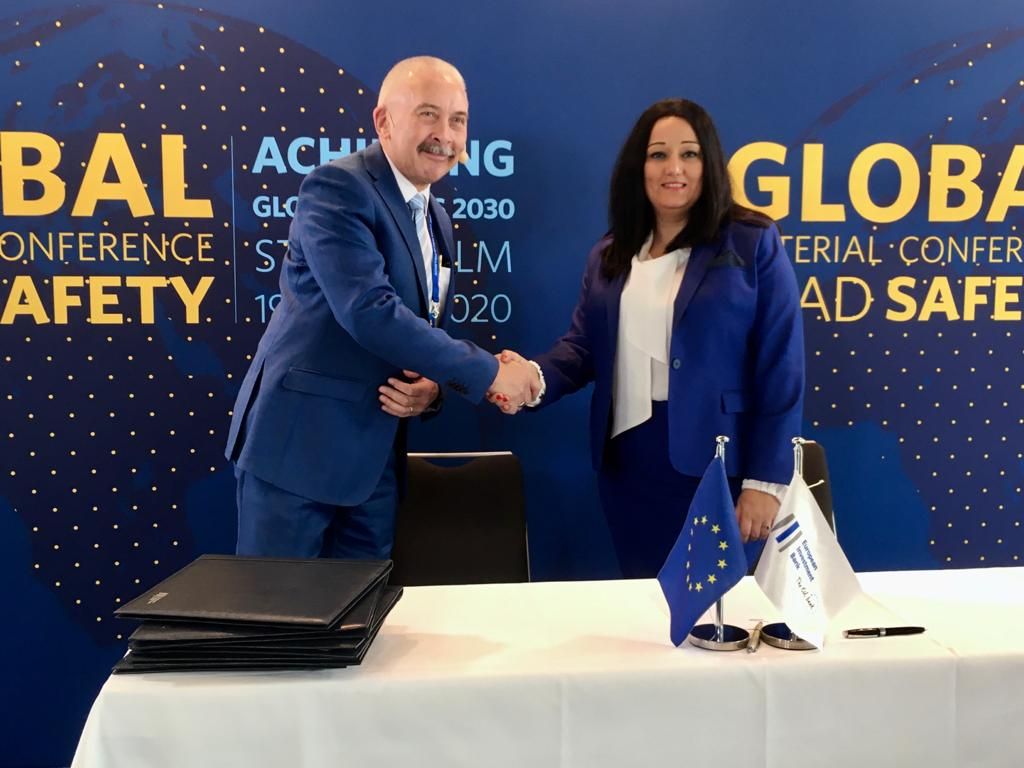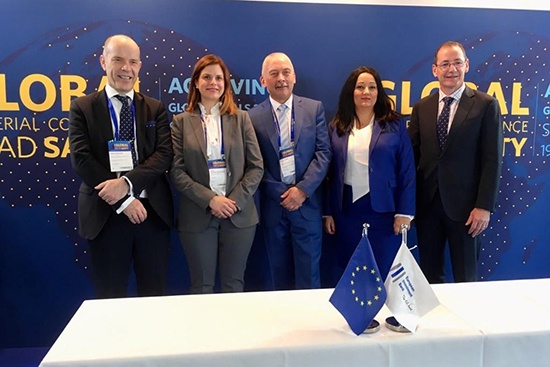
Stockholm, Sweden (February 19) – The European Investment Bank (EIB) today entered a partnership with the three NGOs leading Road Assessment Programmes (RAP) as part of the global drive to halve the 1.35 million annual global road deaths by 2030. The Memorandum of Understanding was signed at the 3rd Global meeting of Road Safety Ministers in Stockholm.
The EIB and the European Road Assessment Programme (EuroRAP), the International Road Assessment Programme (iRAP), and the Road Safety Foundation (RSF) joined forces to specifically support investment in national and regional “safer road” projects and to develop the analysis and skill sets needed to make investment in safer road infrastructure successful.
“We aim to finance road projects that will help to save lives and prevent serious injuries. The reward both in humanitarian and in economic terms is huge,” said EIB Group Vice-President Lilyana Pavlova, responsible for the bank’s transport operations. ”We, therefore, need to provide not only finance but also access to the required advice, training and skills to develop large scale safer road investment programmes. We all need to work closely together to improve safety on our roads. That is why we are delighted to enter this partnership with the RAP organisations.”
EuroRAP’s Chairman Ferry Smith, who signed the agreement on behalf of the three RAP organisations, said: “This is a welcome initiative from the EIB. The challenge of the next decade is in managing infrastructure safety in a new way, which needs a changed approach and new skills. On behalf of the Road Safety Foundation, EuroRAP and iRAP, I am delighted that we can support EIB in this lifesaving initiative with massive potential throughout Europe and worldwide. We hope, in the future, to extend RAP protocols into urban areas with a focus on pedestrian and cyclist safety as well as assessing the fitness of roads to support connected and increasingly automated vehicles.”
Systematically preventing deaths and serious injuries linked to road crashes is a priority of the EIB, the EU’s bank, which provides finance and expertise for investment projects worldwide. The Memorandum of Understanding is aligned with the new EU Strategic Plan for Road Safety, which aims to cut deaths in Europe by half by 2030 and introduces major changes to the way infrastructure safety is measured and managed. The European Union (EU) Road Infrastructure Safety Management Directive (RISM) now extends to a new ‘primary’ inter-urban road network on which more than a third of European deaths are concentrated. RISM requires all EU countries to inspect the in-built safety of their primary network by end-2024 – and target action to make these busy and often high-risk roads safe.
The protocols of the International Road Assessment Programme, which measure in-built infrastructure safety in a consistent and systematic, way have now been applied in more than 100 countries worldwide as part of the UN Decade of Action for Road Safety 2011-2020. Many busy roads do not yet achieve the 3-Star or better RAP benchmark, which is contained in the World Health Organisation’s global performance tracking framework.
The Road Safety Foundation has carried out analysis across Europe to identify practical investment strategies and budgets that will bring both high economic returns and save lives. EuroRAP’s Members come from civil society, road authorities and research institutions, and are currently overseeing applications in more than 20 European countries across Europe to identify practical investment strategies and budgets that will bring both high economic returns and save lives.
. -ENDS-
Main image above: EIB MOU signing from left to right – EIB Director of Mobility Gavin Dunnett, EuroRAP Secretary General Lina Konstantinopoulou, EuroRAP’s Chairman Ferry Smith, EIB Group Vice-President Lilyana Pavlova and iRAP CEO Rob McInerney (Image credit: iRAP)
Images below: EIB MOU signing with EuroRAP’s Chairman Ferry Smith and EIB Group Vice-President Lilyana Pavlova


BACKGROUND
Press contacts
European Investment Bank:
Lorenzo Squintani, tel. : +352437982528 l.squintani@eib.org
Website: www.eib.org/press – Press: +352 4379 21000 – press@eib.org
iRAP
Judy Williams, mob/Whats app +61 400 782 204, judy.williams@irap.org
EuroRAP and Road Safety Foundation:
Becky Hadley becky.hadley@Hadstrong.com
About the EIB
The European Investment Bank (EIB) is the long-term lending institution of the European Union owned by its Member States. It makes long-term finance available for a sound investment to contribute towards EU policy goals.
About the International Road Assessment Programme (iRAP)
The International Road Assessment Programme (iRAP) is a registered charity dedicated to saving lives through safer roads, established to support the UN Decade of Action for Road Safety 2011-2020. iRAP works in partnership with government and non-government organisations to: inspect high-risk roads and develop Star Ratings and Safer Roads Investment Plans; provide training, technology and support that will build and sustain national, regional and local capability and to track road safety performance so that funding agencies can assess the benefits of their investments.
About The European Road Assessment Association (EuroRAP AISBL)
The European Road Assessment Programme (EuroRAP) is an international not for profit association set up in 1999 and registered in Belgium that is dedicated to saving lives through safer roads. The programme aims to reduce death and serious injury through a programme of systematic assessment of risk, identifying the major shortcomings that can be addressed by practical road improvement measures. It forges partnerships between those responsible for a safe road system – civil society, motoring organisations, vehicle manufacturers and road authorities – and aims to ensure that assessment of risk lies at the heart of strategic decisions on route improvements, crash protection and standards of route management.
About The Road Safety Foundation (RSF)
The Road Safety Foundation is a UK based charity founded as a permanent legacy of European Road Safety Year 1986. The charity develops road casualty reduction through simultaneous action on all three components of the safe road system: roads, vehicles and behaviour. The charity has enabled work across each of these components and its reports and analysis have provided the basis of new legislation or policy.
Notes for editors
- 20 years ago, the Swedish, Dutch and British governments partnered with Europe’s mobility clubs to create the first Road Assessment Programme, EuroRAP. The aim was to echo the partners’ previous success with the European New Car Assessment Programme, which had quickly raised the standard of New Car safety from 1- or 2 stars to 4- and 5 with tens of thousands of lives saved.
- The first decade of the Road Assessment Programme saw rapid application of the new protocols across Europe measuring the safety of road infrastructure in a consistent way for the first time. With EU support, EuroRAP’s Road Safety Atlas project later mapped the wide variations in road infrastructure safety across Europe in more than 20 countries from Arctic to Mediterranean. The work revealed that the risks of death and serious injury on roads varied 10 or 20 fold, even in the same country. And that 1- and 2- Star roads were common.
- 10 years ago EuroRAP received a prestigious Award for establishing the International Road Assessment Programme, iRAP. iRAP’s role was to act as the global umbrella to support the UN Decade of Action for Road Safety 2011-2020. iRAP manages and develops the protocols and the associated advanced software systems and incubates new regional programmes such as today’s ChinaRAP, IndiaRAP and AfricaRAP.
- More than 100 countries worldwide have now applied the RAP protocols with more than 1 million kms assessed. Billions of safer investment has been shaped. iRAP is an undoubted achievement of the UN collaboration involving hundreds of organisations and tens of millions of generous donations in kind and in cash, not least from the FIA Foundation.
- Looking to 2030, measuring infrastructure safety is only a first step towards managing it systemically. The Swedish, Dutch and British governments were among the first to set goals for the safety they wanted from their national networks. Now the new WHO global performance framework sets a clear 3–Star minimum benchmark for all new infrastructure. The recommendation is that countries should target the busy main roads on which 50% of deaths are commonly concentrated, typically busy all-purpose roads.
- The EU’s new road safety pillar builds on the global indicators. The revised Road Infrastructure Safety Management Directive (RISM) will apply where trauma is concentrated on a new ‘primary’ inter-urban network. Inspections of in-built safety will be required by 2024, and prioritisation of action. The rule of thumb is that each Star gained halves deaths and serious injuries.
- EuroRAP and its members contributed much to the development of RISM. EuroRAP’s current programme has work taking place in more than 20 European countries in national, collaborative or toll road programmes. EuroRAP has established a new NGO in Slovenia to support work particularly in the western Balkans. Next generation development on AI and vehicle automation is centred in Brussels so roads and vehicles are better developed as a system. The need is for roads that cars, as well as humans, can read.
- In Europe, EuroRAP’s civil society Members have led raising understanding and awareness of the importance of infrastructure safety. In this coming decade, a closer partnership is being built to support road authorities and operators with the motor industry: only road owners can make the practical life-saving infrastructure improvements needed. For example, in an example of best practice, the National Motorway Company in Slovakia raised the safety of a network from 27% at 3-Star to 77% at 3-Star in less than 2 years.
- This type of Safer Road Investment Programme must become routine in the decade to 2030 which marks the move from measuring to pro-actively managing safety. In Sweden there has been a commitment to raise the safety of thousands of kilometres of network to beyond 3-Star. While major new and improved sections of roads will continue to be part of upgrading roads, investing in safety features along long lengths of network is required to protect people against brutal head-on collisions and unsafe roadsides and junctions.
- In 2008, the OECD urged its member countries to focus on the economic cost of road crashes. More than €100 billion is lost annually in the EU alone and close to 3% of GDP globally. The EU aspires to achieve zero road deaths by 2050. In 2008, the OECD said such a journey “will alter the community’s view of the inevitability of road trauma, alter institutional and societal responsibilities and accountability and change the way in which road safety interventions are shaped.” Some 10 years later, evidence given to the Australian inquiry into road safety spoke of the struggle to deal with the legacy approach and ‘’re-orient policies, practices and designs”.
- In Europe, the EIB’s Safer Transport Platform provides a gateway to advisory services that support the uptake of funding and financing opportunities for EU projects that improve road safety. It recognises one of the key challenges of the next decade is managing infrastructure safety in a new way that requires a changed approach and new skills.


















